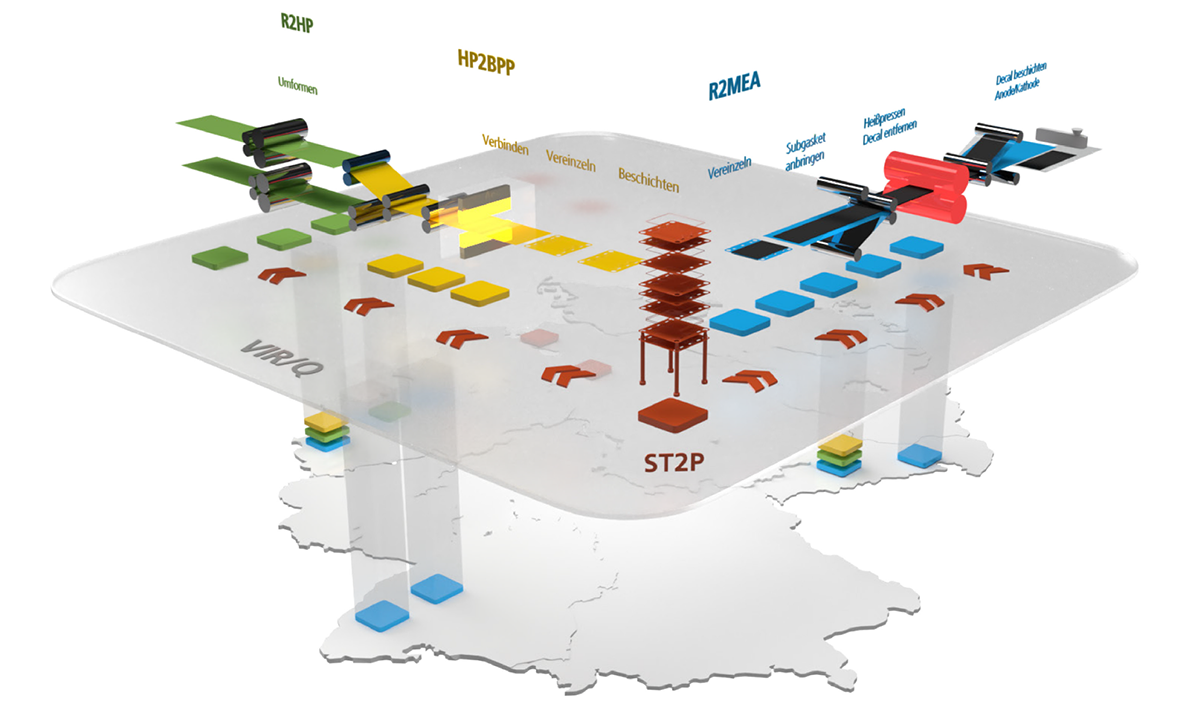Research project "H2GO"
Cost-Efficient Production Technologies for Fuel Cells
As a part of Germany’s energy transition, hydrogen is playing an increasingly important role as an energy carrier. In mobility applications, people and goods can be transported emission-free by electricity from hydrogen-powered fuel cells. Currently, however, hydrogen is only produced in small quantities, which explains the high acquisition costs for fuel-cell systems. To enable future mass production, 19 Fraunhofer institutes are advancing manufacturing technologies for fuel-cell systems and components in the joint project "H2GO". They are enhancing existing processes as well as developing new processes for the production of tomorrow and beyond. With efficient processes suitable for series production, manufacturing costs can be reduced and hydrogen-based drives can establish themselves on the market as an important element of the energy transition. The consortium is setting up a decentralized production infrastructure that is brought together by building virtual production lines with digital twins. Industrial companies have the opportunity to use the production infrastructure and build their own manufacturing capacities in the hydrogen-sector value chain on this basis.
Production of the fuel cell in 5 sub-units
To develop the production technology for the individual components of the fuel cell, "H2GO" is organized into five sub-groups. Work is being carried out on the bipolar plate (BPP) made of metal and compound materials, the membrane electrode assembly (MEA), de-assembly and virtual production.
Fraunhofer IPT leads the work on forming BPP for different materials and is involved in the further production steps of BPP and MEA. The institute uses its decades of experience in the field of clocked and continuous production processes to implement manufacturing in short cycle times and high quality as well as reproducibility. In addition to developing and constructing special machines for specific processing steps, the researchers use methods of digitization and tracking to achieve the high accuracies required in a safe manner. Furthermore, they place great importance on the automation of individual process steps as well as intralogistics, the fully automated forwarding of a semi-finished product to the next machining step. Existing machining processes are to be optimized by up to 50% in speed and 30% in costs from the developments in "H2GO".
Industry benefits from research
The developments and innovative production solutions in “H2GO” will make it easier for industry to start creating its own value in the hydrogen sector. In addition to using individually developed special machines, companies will benefit from additional measures in automation and digitization that they can incorporate into their own production. This leads to higher product quality and reduces costs in the production of hydrogen systems.
Funding
The project "H2GO" is funded by the Federal Ministry of Digital Affairs and Transport (BMVD) within the framework of the National Innovation Program Hydrogen and Fuel Cell Technology Phase 2 (NIP II).
Funding code for the sub-network R2HP: 03B11027B
Project executing agency
Project Management Jülich (PTJ)

Publications from this project
| Jahr Year | Titel/Autor:in Title/Author | Publikationstyp Publication Type |
|---|---|---|
| 2025 | Kontinuierliches Austrennen und Freischneiden von BPP bei 30 m/min Bandgeschwindigkeit Veliu, Aldo; Borkmann, Madlen |
Poster |
| 2025 | Numerical Modelling of Tool Wear in Forming of Metallic Bipolar Plates for PEM Fuel Cells Langenstück-Lee, Sangwook; Egbers, Kees; Borole, Yogesh; Hüsing, Florian; Brecher, Christian |
Zeitschriftenaufsatz Journal Article |
| 2025 | Numerical Modelling of Tool Wear in Forming of Metallic Bipolar Plates for PEM Fuel Cells Langenstück-Lee, Sangwook; Egbers, Kees; Borole, Yogesh; Hüsing, Florian; Brecher, Christian |
Vortrag Presentation |
| 2025 | Shielding gas supply fixture for improvement in weld quality of laser welded fuel cell bipolar plates Nagarkar, Apoorva; Sperling, Patrick; Koch, Jan-Hendrik; Hüsing, Florian; Brecher, Christian |
Vortrag Presentation |
| 2025 | Experimental evaluation of a feature based bipolar plate forming approach in a hybrid tool Albers, Dennis; Ngondji, Karl; Hüsing, Florian; Brecher, Christian |
Konferenzbeitrag Conference Paper |
| 2025 | Factory Cloud und Datenräume - Zukunft der Produktion Gilerson, Andre; Sankal, Talib |
Zeitschriftenaufsatz Journal Article |
| 2025 | Development of technical cleanliness levels and cleaning routines for line manufacturing of bipolar plates from half plates Uhlmann, Eckart; Polte, Julian; Neuwald, Tobias; Burgdorf, Philipp |
Konferenzbeitrag Conference Paper |
| 2024 | Disassembly technologies for PEMFC stacks in heavy-duty applications Oldewurtel, Sven; Wagner, Arne; Imdahl, Christoph; Zellmer, Sabrina; Dröder, Klaus |
Zeitschriftenaufsatz Journal Article |
| 2024 | Challenges in the Production of Fuel Cells for Aviation Sperling, Patrick; Horstkotte, Rainer; Sommer, Jan; Gierlings, Sascha; Janssen, Henning; Herrig, Tim; Bergs, Thomas; Brecher, Christian |
Konferenzbeitrag Conference Paper |
| 2024 | Numerical modeling of wear on forming dies in high-volume metallic bipolar plate production for fuel cells Lee, Sangwook; Egbers, Kees; Albers, Dennis; Janssen, Henning; Brecher, Christian |
Vortrag Presentation |
| 2024 | Restschmutzanalyse durch multispektrale Thermografie Herzer, Fabian; Wassermann, Felix |
Zeitschriftenaufsatz Journal Article |
| 2024 | Feature based bipolar plate forming Meelkop, Dennis; Janssen, Henning; Brecher, Christian |
Zeitschriftenaufsatz Journal Article |
| 2024 | Entwicklung des Produktionshochlaufs der Brennstoffzellen weltweit Döscher, Henning |
Aufsatz in Buch Book Article |
| 2023 | Brennstoffzelle - wie sauber muss es sein? Tammer, Christoph; Schießl, Timo; Burgdorf, Philipp |
Zeitschriftenaufsatz Journal Article |
| 2023 | Investigation of system induced causes of defects on metallic bipolar plates in progressive die forming Lee, Sangwook; Meelkop, Dennis; Janssen, Henning; Brecher, Christian |
Konferenzbeitrag nicht im Tagungsband Conference Paper not in Proceedings |
| 2022 | H2GO - Nationaler Aktionsplan Brennstoffzellen-Produktion Döscher, Henning; Weymann, Lukas; Schmaltz, Thomas; Endo, Chie; Schmoch, Ulrich |
Internetbeitrag Internet Contribution |